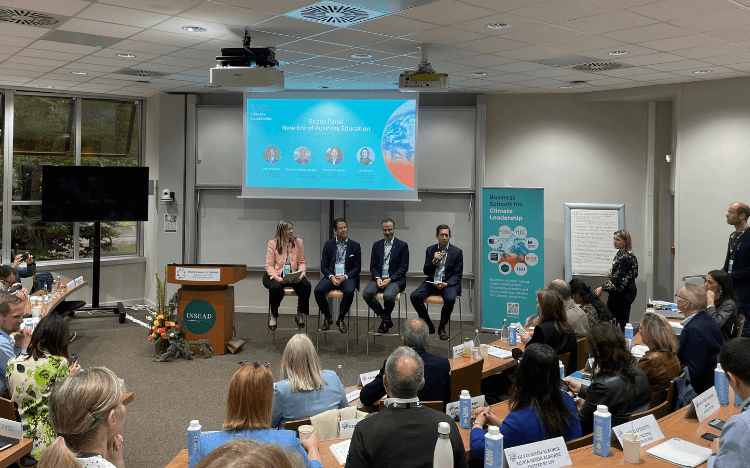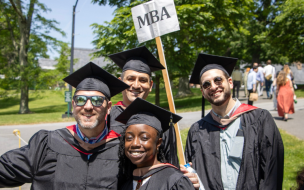However, when it comes to sustainability, a topic that has increasingly gained a foothold in the curriculum in recent years and seen a rise in demand from students, top business schools are subverting the norm and choosing to collaborate.
Following the historic COP26 conference in 2021, where nearly 200 countries signed the Glasgow Climate Pact which set out the necessary steps to tackle the climate emergency, the leaders of eight top European business schools came together to form their own alliance.
Representatives from IE Business School, London Business School, IMD, INSEAD, HEC Paris, IESE Business School, University of Oxford Saïd Business School, and University of Cambridge Judge Business School formed their own partnership, titled: Business Schools for Climate Leadership (BS4CL).
The collective’s mission statement emphasized maximizing the potential of business in battling the climate emergency; with aims to affect change by providing research and informed recommendations for executives, as well as by inspiring and equipping students, alumni, and educators to make an impact.
Since its inception the partnership has inspired further collaboration among business schools across the globe: the past two years have seen the launch of BS4CL Africa and BS4CL Middle East.
At the second edition of the BS4CL Forum, held earlier this month at the INSEAD Europe campus in Fontainebleau, representatives from the eight partner schools gathered to discuss potential solutions for tackling the climate crisis.
Addressing attendees during the keynote speech, Pavan Sukhdev, CEO of GIST Impact, summarized business schools’ commitment to bringing about change as a collective, saying: “There is so much going on, and we want us to be solving the problem.”
READ: 8 Top European Business Schools Gather To Tackle Climate Crisis
The responsibility of business schools when it comes to the climate crisis
There are any number of issues that business schools face day to day, ranging from government changes to visa laws to the rapid emergence of artificial intelligence. But those involved in BS4CL emphasize that sustainability is an altogether different problem.
“Climate is something that's transversal, something that doesn't have borders,” explains Natalia Olynec, chief sustainability officer at IMD.
“Without business at the table, we won't have a solution. It's not just a technical problem, it's also a leadership problem, so we're in a position to have an exponential influence through the people who come through our doors to learn and through our research partnerships.”
Business schools—which list students, alumni, and expert educators and researchers among their key stakeholders—are aware of the impact they can have in the fight against the climate crisis.
“The world does not have a lot of faith anymore in political leadership as an institution. There’s some faith in NGOs, they trust them but don’t think they’re as capable of making an impact. And actually the trust in companies has gone way up—the capability that people think companies have to make change happen is really high,” explains Lee Newman, dean of IE Business School.
“If the world is looking to businesses to address these issues, as business schools there's a clear mandate,” he adds.
The value of collaboration between business schools
It was this responsibility that business schools possess to drive sustainable change that drove the founders of BS4CL to collaborate in the wake of the COP26 conference.
Immediately focused on driving actionable change, the partnership’s first project was to develop a toolkit to help business leaders assess their readiness to adapt to the climate crisis. Participating schools’ expert faculty and researchers each contributed a chapter, producing a comprehensive resource to help further change.
Such research and expertise can help business schools have a far-reaching impact, informing business decisions and influencing policymakers. However, schools can also affect change through various other stakeholders.
Alumni are well-placed throughout key cross-industry positions to have an immediate impact within the companies where they work. For example, the business school graduates in attendance at the recent BS4CL Forum included CEOs, executive directors, advisory council members, and strategic partnership heads.
“For all of us as schools, the biggest asset we have is our alumni network. Now if we can multiply that together I think that has huge potential,” explains Vanina Farber, dean of the IMD Executive MBA and chair for Social Innovation.
“Through our association, we can leverage a huge network of almost half a million alumni around the world,” adds Marie-Pierre Seyfried, project director, Climate & Earth Center, Sustainability & Organizations Institute, HEC Paris.
Sharing expertise and research that can be fed into the classroom also ensures that new generations of students can graduate with the necessary climate expertise to make an impact in future.
Perhaps most importantly for the schools involved, however, is that coming together also allows them to learn: “I like it because we learn from each other. Rather than each having to pilot and repeat the same mistakes, we can share the learnings and help ourselves speed up,” adds Vanina from IMD.
With each coming application cycle, the schools involved in BS4CL will once again compete for top talent at the MBA, Executive MBA, and Masters levels. However, when it comes to fighting the climate crisis, they remain committed to a collective effort.
As IE dean, Lee Newman, says: “We have a belief that we can catalyze and accelerate impact by doing this collectively, rather than individually by school.”









